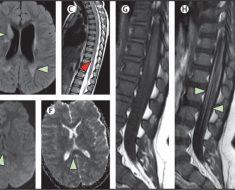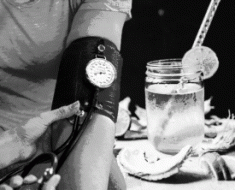
A mum has shared how her healthy son’s eye squint turned out to be a sign of a deadly brain tumour.
Liesje Love, 43, noticed her eight-year-old son Lachie had developed a squint in one of his eyes three days before Christmas in December last year.
While he had been his usual energetic self, when the eye started to turn inward Liesje took him to get checked with an optometrist – and the family’s nightmare began.
Lachie was referred to the emergency department and in January – just one week after going to the doctor – he was officially diagnosed with diffuse intrinsic pontine glioma (DIPG), a type of brain tumour.
The family learned that this form of cancer is both fatal and incurable, and although there were some treatment options available, they could only buy him months of time.
They were told the heartbreaking news that children with this diagnosis survived, on average, for nine months, then advised to ‘go home and make memories’ together while they could.
Liesje, a clinical psychologist, said of the moment her son was diagnosed: ‘I was absolutely devastated
‘He’s so full of life – it just seems too hard to believe as there are no other signs.
‘I don’t think there are words to describe how you truly feel [receiving that news]. Nothing prepares you for this.’

The Auckland, New Zealand-based family were blindsided by their son’s prognosis – particularly given how healthy Lachie appeared to be.
‘His health was great. We had no issues. He was active and high energy,’ recalled the mum.
‘On 22 December he started to squint and one of his eyes started to turn in. Other than that, he was his usual self. He was full of energy, swimming every day, having sleepovers and playing sports with his friends.’
After seeing an optometrist the following day, they returned for a follow-up appointment just after Christmas.
Liesje said: ‘The optometrist was worried and referred us to ophthalmology at our local hospital. We were seen on the 29th and sent to the emergency department, where they did a CT scan and we were admitted.
‘The next day he underwent an MRI and biopsy and they told us about the mass which was clearly seen on the MRI.
‘I had already been Googling so had an idea what they were thinking – and unfortunately was right.’
On January 6, it was confirmed to be a brain tumour, and although they were informed of the limited effective treatments for the condition, to try and fight it off Lachie started radiotherapy on January 23.
The family now hopes to start on a new drug trial after his radiotherapy finished in March. Yet, while this may extend Lachie’s life, he will never be cured.
‘No one knows how long [we have left],’ commented Liesje.
‘There’s also a rebound from the radiotherapy which means things get worse before they get better. It could be months.’

For now, the parents are focused on keeping their son’s spirits up and protecting him as much as possible during the trying times ahead.
Liesje added: ‘He has really struggled with treatment recently and this has taken a lot of coaching to get him through it.
‘He’s also one of the few DIPG kids who seems to have more behavioural/mood symptoms rather than neurological.
‘There seems to be a group that have these symptoms three to six months before the neurological ones, and this has escalated quickly. He can be really reactive, aggressive and obsessional, and it can take hours to calm him down.’
They’re hoping radiotherapy may shrink the tumour enough to lessen symptoms, as ‘it’s hard for everyone in the hours to see him so distressed, aggressive and unable to be calmed down.’
Despite being a clinical psychologist, Liesje says no training could ever have equipped her to deal with the diagnosis.
‘I had thought that I would be helping my kids deal with the death of our family dog soon, not this,’ she said.
‘I spend my days working with grief, but nothing prepares you for this.’
To add to their anguish, Lachie’s loved ones began ‘preparing [themselves] to say goodbye’ in May, when he was admitted to hospital for nine days, unable to move his body or speak clearly.
Fortunately, his condition has improved since and he is able to sit up unaided, can talk again, and is back to joking with his ‘good sense of humour’. The youngster is also going to school for a couple of days a week for an hour or so, allowing him to see friends and experience some semblance of normality amid the aggressive treatments.
Lachie is likely to undergo another round of radiotherapy later this year, so in the meantime his family are focused on making memories with him.
Liesje added: ‘We are trying some immune boosters and vitamins to keep him as healthy as we can, and planning holidays.
‘We’re also looking for fun experiences for Lachie and his little brother.
‘This might be swimming with sharks at the local aquarium, concerts – he’s super keen to see Blake Shelton and Imagine Dragons – and just general fun activities.’
If you’d like to donate to Lachie’s memory-making, visit his Give a Little fundraising page here.
Do you have a story to share?
Get in touch by emailing [email protected].
Source: Read Full Article





